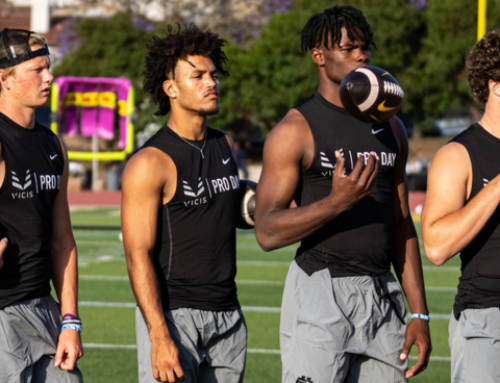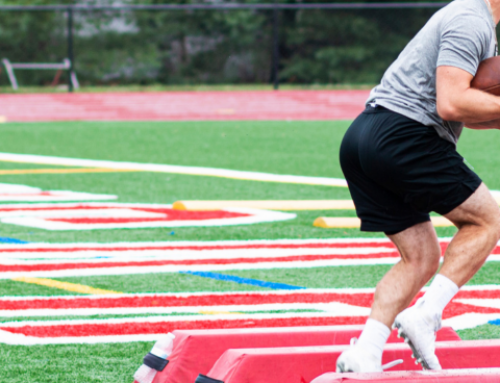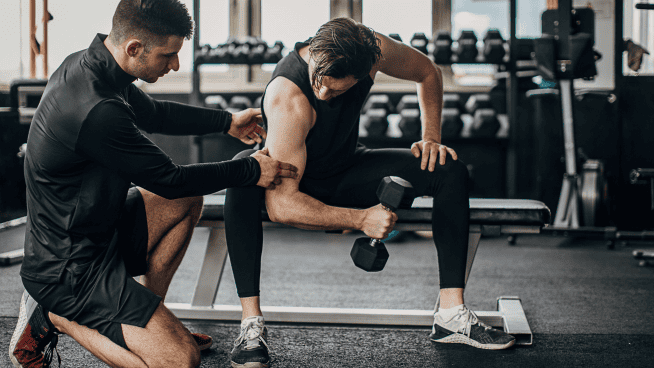Top 10 Supplements for Football Players
Football is a demanding sport at any level. From high school to the pros, football players are always looking for ways to take their game to the next level. One of the easiest, yet most overlooked, ways to do this is to have a solid nutrition and supplement plan. Supplements will ensure you get the most out of your workouts and perform at your peak for four quarters.
Below are the top 10 supplements I recommend to football players looking for results without wasting money on some of the junk being sold today. If you’re looking for the “Super-Mega-Hydro-Power-Bolic-Swole-Gain 9000” that guarantees to turn you into the Hulk, prepare to be disappointed. But if you want proven supplements that provide results with hard work, you’ve come to the right place.
Top 10 Supplements for Football Players
1. Protein Powder
Proteins are the Lego blocks of muscles. If you don’t consume enough protein, you’ll never be able to build the muscle or strength you want. Although plenty of expensive brands of protein are available, plain whey protein concentrate or isolate will do just fine.
2. Fish Oil
Whether you’re just training or in the middle of your season, your body is guaranteed to take a beating. Fish oil not only helps your body deal with injuries, swelling and inflammation, it also lubricates your joints so they get less wear and tear.
3. Green Supplements
I have yet to work with a football player who eats enough vegetables and gets the right amount of vitamins and minerals daily. If you lack these nutrients, you’ll have a harder time building muscle and making it through games without tiring or cramping. By adding a green foods supplement to your diet, you can consume a few vegetable servings at a time with a liquid, a powder or a pill.
4. Creatine
You may eventually hit a training plateau that you just can’t outwork. This is where creatine comes in. It can increase strength and size by stimulating muscle growth; however, it should be taken during the off-season, particularly if you seem to be stuck at your current strength and size levels. Some experts are hesitant to recommend creatine to young athletes, so be sure to consult your doctor and trainer before trying it.
5. Branched Chain Amino Acids (BCAAs)
BCAAs are the building blocks of protein. So why take broken-down protein instead of protein itself? During the long process of digestion, protein breaks down into amino acids the body can use. By taking BCAAs during or after your training session, you give your muscles the exact amino acids they need quicker.
6. Caffeine
Everyone needs a boost now and then, and caffeine is Mother Nature’s version of a swift kick in the pants. You can take 50 to 200mg in the form of coffee or tea before a workout to make sure you have the energy to train your hardest and get the most out of your time in the weight room.
7. Vitamin D
We all know vitamin D comes from sunlight, but do you know if you’re getting enough? If you’re like 95 percent of the population, you’re not. Vitamin D plays a huge role in helping the body absorb calcium, which keeps your bones strong. It also helps keep your immune system functioning optimally so you can spend more time on the field and less in bed sick. When you’re out in the sun during two-a-days, you won’t have to worry too much about vitamin D, but if you’re holed up indoors during the off-season, you probably need a vitamin D supplement.
8. Coconut Oil
If you’re spending all day in class, it’s hard to get enough healthy calories to keep up with your training. Adding a tablespoon of coconut oil to meals is a great way to increase calories. Coconut oil is a Medium Chain Triglyceride (MCT), which means it’s a healthy fat source that the body can easily break down for energy.
9. Multi-Probiotic
You eat and eat and eat to put on size and get stronger. But what happens if all that food you’re consuming doesn’t get digested properly? All your time, money and effort to get bigger for football is just going to waste.
A mutli-probiotic can have millions of the microorganisms found in the stomach and intestinal lining. Although it may sound gross, these microorganisms can really help your body break down food and absorb nutrients.
10. Water
Drinking water is probably the simplest thing you can do to stay healthy and strong for football games, practices and off-season workouts. The body is made up of 70 percent water, and your muscles hold most of that. When you get dehydrated, all the strength and power you worked so hard to build won’t be available to your body. As a rule of thumb, drink half your bodyweight in ounces each day. So if you’re 185 pounds, consume at least 92.5 ounces of water each day.
If you’re working hard this off-season but aren’t seeing the results you expected, stick a few of these football supplements into your training and nutrition program to help take your game to the next level
RECOMMENDED FOR YOU
MOST POPULAR
Top 10 Supplements for Football Players
Football is a demanding sport at any level. From high school to the pros, football players are always looking for ways to take their game to the next level. One of the easiest, yet most overlooked, ways to do this is to have a solid nutrition and supplement plan. Supplements will ensure you get the most out of your workouts and perform at your peak for four quarters.
Below are the top 10 supplements I recommend to football players looking for results without wasting money on some of the junk being sold today. If you’re looking for the “Super-Mega-Hydro-Power-Bolic-Swole-Gain 9000” that guarantees to turn you into the Hulk, prepare to be disappointed. But if you want proven supplements that provide results with hard work, you’ve come to the right place.
Top 10 Supplements for Football Players
1. Protein Powder
Proteins are the Lego blocks of muscles. If you don’t consume enough protein, you’ll never be able to build the muscle or strength you want. Although plenty of expensive brands of protein are available, plain whey protein concentrate or isolate will do just fine.
2. Fish Oil
Whether you’re just training or in the middle of your season, your body is guaranteed to take a beating. Fish oil not only helps your body deal with injuries, swelling and inflammation, it also lubricates your joints so they get less wear and tear.
3. Green Supplements
I have yet to work with a football player who eats enough vegetables and gets the right amount of vitamins and minerals daily. If you lack these nutrients, you’ll have a harder time building muscle and making it through games without tiring or cramping. By adding a green foods supplement to your diet, you can consume a few vegetable servings at a time with a liquid, a powder or a pill.
4. Creatine
You may eventually hit a training plateau that you just can’t outwork. This is where creatine comes in. It can increase strength and size by stimulating muscle growth; however, it should be taken during the off-season, particularly if you seem to be stuck at your current strength and size levels. Some experts are hesitant to recommend creatine to young athletes, so be sure to consult your doctor and trainer before trying it.
5. Branched Chain Amino Acids (BCAAs)
BCAAs are the building blocks of protein. So why take broken-down protein instead of protein itself? During the long process of digestion, protein breaks down into amino acids the body can use. By taking BCAAs during or after your training session, you give your muscles the exact amino acids they need quicker.
6. Caffeine
Everyone needs a boost now and then, and caffeine is Mother Nature’s version of a swift kick in the pants. You can take 50 to 200mg in the form of coffee or tea before a workout to make sure you have the energy to train your hardest and get the most out of your time in the weight room.
7. Vitamin D
We all know vitamin D comes from sunlight, but do you know if you’re getting enough? If you’re like 95 percent of the population, you’re not. Vitamin D plays a huge role in helping the body absorb calcium, which keeps your bones strong. It also helps keep your immune system functioning optimally so you can spend more time on the field and less in bed sick. When you’re out in the sun during two-a-days, you won’t have to worry too much about vitamin D, but if you’re holed up indoors during the off-season, you probably need a vitamin D supplement.
8. Coconut Oil
If you’re spending all day in class, it’s hard to get enough healthy calories to keep up with your training. Adding a tablespoon of coconut oil to meals is a great way to increase calories. Coconut oil is a Medium Chain Triglyceride (MCT), which means it’s a healthy fat source that the body can easily break down for energy.
9. Multi-Probiotic
You eat and eat and eat to put on size and get stronger. But what happens if all that food you’re consuming doesn’t get digested properly? All your time, money and effort to get bigger for football is just going to waste.
A mutli-probiotic can have millions of the microorganisms found in the stomach and intestinal lining. Although it may sound gross, these microorganisms can really help your body break down food and absorb nutrients.
10. Water
Drinking water is probably the simplest thing you can do to stay healthy and strong for football games, practices and off-season workouts. The body is made up of 70 percent water, and your muscles hold most of that. When you get dehydrated, all the strength and power you worked so hard to build won’t be available to your body. As a rule of thumb, drink half your bodyweight in ounces each day. So if you’re 185 pounds, consume at least 92.5 ounces of water each day.
If you’re working hard this off-season but aren’t seeing the results you expected, stick a few of these football supplements into your training and nutrition program to help take your game to the next level










